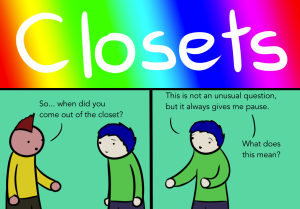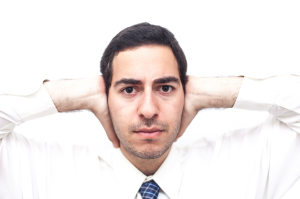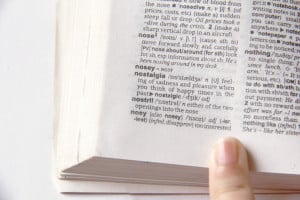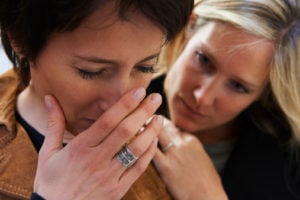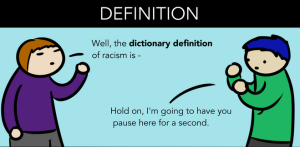
A person eating a slice of pizza side-eyes their friend, who’s only eating a salad.
Originally published on Medium and republished here with the author’s permission.
(Content Warning: eating disorders)
Dear Person Wishing to Better Themselves in 2016,
Hi.
A few years ago, I used to write about health and fitness professionally. And during that time, I wrote a lot of articles about resolving to eat better and move more in the new year. I did this because I knew that people wanted to read these things, so I want you to know that you’re not alone.
As you’re clicking and reading and possibly even sharing these articles – articles about how to eat better in the new year, how to exercise more effectively, how to make time for green smoothies and whole foods, about how to cut added sugar or switch to Soylent or whatever else the kids are doing these days – know that those articles exist because the people who publish them are looking to start their year off by capitalizing on what they know you’re looking for.
Because around this time of year, a lot of people are looking for ways to improve their lives and selves, and food and exercise are typically ways in which we encourage people to do so.
It’s not on you.
The diet industry has been pushing this on you since before you were you. They pushed it on your mom. And your grandmother.
You were set up to want this from the jump, and they’re really hoping you’ll buy it.
That said, I want to quickly tell you that, while I am really, really happy for you if this is indeed what you want – because I am.
Eating food that nourishes your body and exercising are things that I am very passionate about in my life – but I wish everyone would remember that there are a lot of people, some in your inner circles and probably quite a few in your social media realms, for whom healthy eating and exercise are just a quick skip away from something that is very much the opposite of healthy.
During that time when I was writing about health and fitness, I was myself struggling with a combination eating disorder that falls under the umbrella diagnosis of EDNOS or OSFED but, at that time, looked quite a bit more like orthorexia, or an unhealthy obsession with healthy food.
I know. It’s confusing. It was confusing for me, too.
Though not recognized by the DSM, orthorexia has gained a lot of attention in the last few years as a very real facet of disordered eating, fueled in large part by our collective focus on “healthy” (or “clean”) eating.
Recently, the term gained new recognition as blogger and author Jordan Younger came forward with her own story in a memoir called Breaking Vegan. In an essay on Refinery 29 in November, she described her battle as such:
“During my recovery process, I learned that the ‘superhuman willpower’ I’d exercised for so long is a typical eating disorder warning sign. I was trying to control my life through food, and I believed I was worthy and powerful because I treated my body like a temple (which, to me, meant eating nothing but plants).”
Of course, Younger’s story isn’t universal; plenty of folks live perfectly balanced, non-disordered lives that include a focus on healthy food.
I was not one of those people, because I am not a person who has had a very healthy relationship with food or exercise or my body for basically ever. Even today, my relationship with my jawbone exists in a tight balance of accountability and forgiveness.
Recognition of orthorexia has been part of a multi-faceted cultural shift regarding eating disorders and the way we collectively view food, movement, and our bodies.
As we’ve begun to confront the reality that eating disorders are complex – whether it’s addressing the reality of diabulimia, or shaking down the often held, but extremely inaccurate view that eating disorders are solely the plight of white people, or examining the relationship of sexual violence or poverty or abuse or addiction to disordered eating – so, too, do we have to wrangle with the fact that “healthy” eating is not a universally good or positive thing.
Which brings me to New Year’s Eve and, of course, resolution season.
We hang a lot of our baggage around food and the body on the holidays, and with the New Year, we’re encouraged to “fix” it.
But what if there is nothing to fix? What if we allowed ourselves to eat the things that brought us joy, and then engaged in activities that made us feel well and strong and hearty and just plain good?
What if there is nothing that 2017 can correct? What if weight loss actually doesn’t fucking fix anything?
In a super-essential piece of reading on Mashable from 2015, body positive activists shared their thoughts on the New Year – and, specifically, what it means for eating, moving, and the body. Virgie Tovar’s comments, especially, struck me:
What if I told you that the current you was actually pretty awesome and you didn’t, in fact, need a you-replacement? I’m an anti-resolution enthusiast because my 250-pound body is perfect just as it is… Reframe the ideology that positions your body as the thing that is keeping you from fulfilling your greatest (and skinniest) destiny. Your body is many things, but I promise it’s not your enemy. The size of your body will never be the most important or greatest thing about you.
The size of your body will never be the most important or greatest thing about you.
Which is not to say that there’s no place in your life – in our lives – for resolutions. Each year, I set several goals (usually career-based goals, but whatever works for you) for myself, because I am competitive and because I like a challenge.
But what a revolutionary act it is to say, “Actually, I am fine. It was a good year, and next year will be good, as well.” Or, perhaps, to say “I feel like I could focus on improving myself in some ways – but you don’t need to feel pressured to do the same.”
That brings me to the real point of this, which is that it is perfectly acceptable if you choose to start on a path of healthy eating and exercising this January – that could be great for you, and I hope that it is – but that I would ask you to consider how you talk about it, because one person’s “healthy diet” post is another person’s unexpected push back into a cycle of self-harm.
Drink your green smoothies. Take pictures of your healthy breakfast. Share your recipes that are full of vegan protein. Feed your body good food because it feels good.
But please, do so with warmth in your heart and an understanding that it can be hard for some of us.
The deluge of inspiration can also feel like a landslide of guilt; for every one person committing to a “new you,” there are a half dozen of us kicking ourselves for not doing it, and another few who do something that is actually worse for them, and maybe some others who know that they can’t do that because they are like me.
Have a happy New Year, but also have a healthy one – really healthy. Healthy in the way that communities are healthy when they support each other and bodies are healthy when they’re cared for.
Healthy in a way that that doesn’t hurt someone else as a byproduct.
[do_widget id=’text-101′]
Hanna Brooks Olsen is a writer, small human, and a Millennial. Her interests are politics, podcasts, Pac-12 football, feminism, and Oxford commas. She is curious to a fault. Follow her on Twitter @mshannabrooks.
Search our 3000+ articles!
Read our articles about:
Our online racial justice training
Used by hundreds of universities, non-profits, and businesses.
Click to learn more








